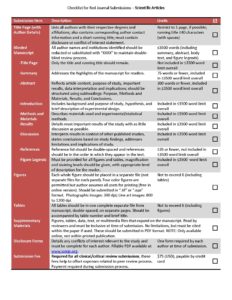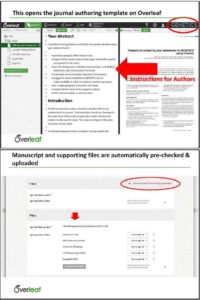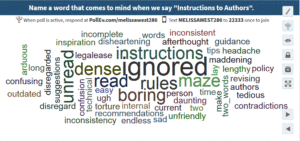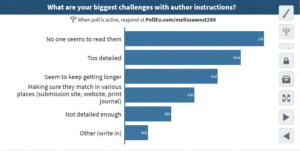MODERATOR:
Shari Leventhal
Managing Editor
Clinical Journal of the American Society of Nephrology
Derwood, Maryland
SPEAKERS:
Mary Anne Baynes
Chief Marketing Officer
Overleaf
Raleigh, North Carolina
Katherine Bennett
Managing Editor
Scientific Publications, American Society for Radiation Oncology
Southlake, Texas
REPORTER:
Shari Leventhal
Updating and maintaining a journal’s instructions for authors are often some of the more tedious tasks of an editorial team. Most editors will agree that their instructions should be improved but often don’t know the best ways to improve them. This session was developed to provide examples of how to help make instructions for authors and related materials simpler for submitting authors while maintaining the elements for the manuscript process that are important to the editorial team.
Katherine Bennett, Managing Editor, Scientific Publications, for the American Society for Radiation Oncology (ASTRO), was the first speaker to present during the session and discussed the checklist that ASTRO’s Red Journal (International Journal of Radiation Oncology), one of its three publications, offers their authors to ensure submission compliance in an easily understandable format (Figure 1).

Bennett explained that the Red Journal’s instructions for authors are 22 pages and a total of 7525 words. According to Bennett, they created the checklist to balance “the constant back and forth of trying to simplify [and] make [the instructions] shorter” and at the same time address “the need to lengthen [them] for authors who litigate every point.” The checklist provides an easily printable and simplified list of key items for authors to review as they finish preparing their manuscripts for submission. Bennett explained the checklist is helpful primarily as a way to “boil down formatting requirements,” but it cannot replace the Red Journal’s lengthy instructions for authors, which provides important information for authors submitting to the journal.
Mary Anne Baynes, Chief Marketing Officer at Overleaf, followed Bennett’s talk to explain how Overleaf and other authoring tools can make the process of writing, editing, and publishing scientific documents quicker and easier. Baynes provided background on how author collaboration has changed significantly in recent years and provided visuals to show that Overleaf and other authoring tools can help improve the experience for authors directly from their writing platforms (Figure 2).

She also demonstrated how instructions can be customizable and authors can check for adherence prior to submission. Some peer-review systems now have integration directly with Overleaf or other authoring tools that streamline the process for authors, including updating proper formatting based upon journal style, which could help reduce the need for overly detailed instructions for authors.
Finally, the speaker and moderator Shari Leventhal introduced an interactive component to this session to help enliven the atmosphere and engage participants. As participants entered the session room prior to the start of the session, an electronic poll was on the screen, made available through Poll Everywhere. Participants were told they could answer the question on the screen and the interactive component would be revisited following the two speakers (Figures 3 and 4).


The questions were developed by the speakers and moderator as a way to share frustrations and brainstorm with one another on what works or might work to improve the process. Participants were receptive to the interactive format and engaged in asking questions and sharing answers with one another.
